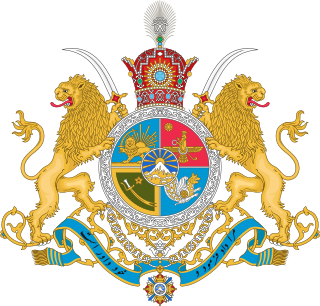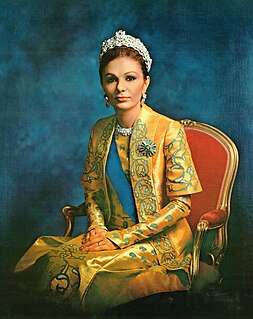
Reza Shah Pahlavi was an Iranian military officer, politician, and first Shah of the House of Pahlavi of the Imperial State of Iran and father of the last Shah of Iran. He reigned from 15 December 1925 until he was forced to abdicate by the Anglo-Soviet invasion of Iran on 16 September 1941. Reza Shah introduced many social, economic, and political reforms during his reign, ultimately laying the foundation of the modern Iranian state. Therefore, he is regarded as the founder of modern Iran.

The Pahlavi dynasty is the last Iranian royal dynasty, ruling for almost 54 years between 1925 and 1979. The dynasty was founded by a non-aristocratic Mazanderani soldier in modern times, who took on the name of the Pahlavi language spoken in the pre-Islamic Sasanian Empire in order to strengthen his nationalist credentials.

The Academy of Persian Language and Literature (APLL) is the regulatory body for the Persian language, headquartered in Tehran, Iran. Formerly known as the Academy of Iran, it was founded on May 20, 1935, by the initiative of Reza Shah, the founder of Pahlavi dynasty.

Shiraz University is a public university located in Shiraz, Fars, Iran, established in 1946. Being one of the oldest and most prestigious modern universities in Iran, Shiraz University is listed among the top three research-oriented schools in the nation according to a ranking of Iranian universities based on scientific output. In the first report of state universities ranking and among almost 70 universities and higher education institutes, Shiraz University is regarded as first-level university.

The Party of Resurrection of the Iranian Nation or simply Rastakhiz Party was Iran's single legal political party from 2 March 1975 until 1 November 1978, founded by the Shah Mohammad Reza Pahlavi.
Aryamehr was the title used in the Pahlavi dynasty by Shahanshah Mohammad Reza Shah of Iran. It means Light of the Aryans.

Mohammad Ali Foroughi, also known as Zoka-ol-Molk, was a writer, diplomat and politician who served three terms as Prime Minister of Iran.

Iranian studies, also referred to as Iranology and Iranistics, is an interdisciplinary field dealing with the research and study of the civilization, history, literature, art and culture of Iranian peoples. It is a part of the wider field of Oriental studies.

Mahnaz Afkhami is an Iranian women's rights activist who served in the Cabinet of Iran from 1976 to 1978.

Mohammad Reza Pahlavi, also known as Mohammad Reza Shah, was the last Shah (King/Sultan) of the Imperial State of Iran from 16 September 1941 until his overthrow in the Iranian Revolution on 11 February 1979. Due to his status as the last Shah of Iran, he is often referred to simply as the Shah.
Gholam Reza Afkhami is an Iranian-born American scholar, author, educator, and a former Pahlavi Iran government official. He is the senior scholar and director of Social Science Research and International Studies at the Foundation for Iranian Studies. The Foundation for Iranian Studies is a Bethesda, Maryland-based research institution dedicated to the study of Iranian history, culture, economy and politics, created with the financial support from Princess Ashraf Pahlavi.

Gholām-Hossein Sā'edi MD was a prolific Iranian writer.

Farah Pahlavi is the widow of the last Shah of Iran, Mohammad Reza Pahlavi, and was successively Queen and Shahbanu of Iran from 1959 to 1979. She was born into a prosperous family whose fortunes were diminished after her father's early death. While studying architecture in Paris, France, she was introduced to the Shah at the Iranian embassy, and they were married in December 1959. The Shah's first two marriages had not produced a son—necessary for royal succession—resulting in great rejoicing at the birth of Crown Prince Reza in October of the following year. Diba was then free to pursue interests other than domestic duties, though she was not allowed a political role. She worked for many charities, and founded Iran's first American-style university, enabling more women to become students in the country. She also facilitated the buying-back of Iranian antiquities from museums abroad.

Gholam Reza Pahlavi was an Iranian prince and a member of the Pahlavi dynasty, as the son of Reza Shah and half-brother of Mohammad Reza Pahlavi, the last Shah of Iran.

Abdul Reza Pahlavi was a member of Iran's Pahlavi dynasty. He was a son of Reza Shah and a half-brother of Mohammad Reza Pahlavi.

Hassan Alavikia was a general and businessman in the Pahlavi pre-revolutionary government of Iran. Along with Teymur Bakhtiar and Hassan Pakravan, he was a co-founder of the SAVAK.
Middle Eastern Americans are Americans of Middle Eastern background. According to the United States Census Bureau, the term "Middle Eastern American" applies to anyone of West Asian or North African origin. This includes people whose background is from the various Middle Eastern and West Asian ethnic groups, such as the Kurds and Assyrians, as well as immigrants from modern-day countries of the Arab world, Iran, Israel, Turkey and sometimes Armenia.

Fathollah Minbashian was an Iranian general. He served in the Iranian army from 1938 to 1972, reaching the rank of four-star general as Commander of the Imperial Iranian Ground Forces (1969-1972), during the reign of Shah Mohammed Reza Pahlavi.

Alinaghi Alikhani was an Iranian economist who held government posts in the 1960s and was the first minister of economy. He also served as the Chancellor of Tehran University.
The 1973 Sale and Purchase Agreement was a 20-year agreement pressured by the Shah of Iran on the oil consortium that nullified The Consortium Agreement of 1954 and provided the National Iranian Oil Company with complete control of Iranian petroleum nationalizing the nation’s oil reserves. By 1975, western oil companies complained of the agreement and demanded renegotiation marking the first time in history that oil companies rather than the oil producing nations sought to negotiate an oil contract.
















